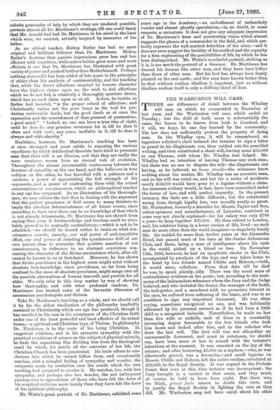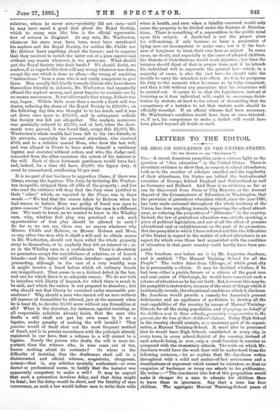THE WARBURTON WILL CASE. THE WARBURTON WILL CASE.
THERE are differences of detail between the Whalley will case, on which we commented in December of last year, and the Warburton will case, which ended on Tuesday ; but the drift of both cases is substantially the same, the lesson to be drawn from both is identical, and it will, we hope, be one day learned by the community. The law does not sufficiently protect the property of dying men. In the Whalley case, it will be remembered, an ingenious solicitor's clerk induced the testator to sign a letter in pencil to his illegitimate son, then rubbed out the pencilled writing, and then substituted a short will, leaving some £55,000 to one Thomas, with whom Mr. Whalley had lodged. Mr. Whalley had no intention of leaving Thomas any such sum; but there was no one to dispute tbe will—the illegitimate son having, as he believed, no locus standi—the witnesses knew nothing about the matter, Mr. Whalley was an eccentric man, and so the will was acted on, and but for a series of accidents nearly 250,000 would have gone to a legatee without a claim. An immense robbery would, in fact, have been committed under the forms of law, and with perfect impunity. In the present instance, the facts are a little different; but the substantial wrong done, though legally less, was morally nearly as great. Mr. Warburton, formerly a traveller for Messrs. Taylor and Son, cotton-spinners and manufacturers, of Leicester, contrived in some way not clearly explained—for his salary was only £700 a year—to heap together £35,000. He then retired to London, and, his relatives being in a lower station of life, lived—as such men do more often than the world imagines—a singularly lonely life. He resided for more than twelve years at the Alexandra Hotel, but passed most of his time at the Junior Athenaeum Club, and there, being a man of intelligence above his rank in the world, picked up a friend or two. On November 13th, 1880, however, he had an apoplectic stroke in the Club, accompanied by paralysis of the legs, and was taken home to the hotel by two friends named Childs and Hobson,—both, it would seem, solicitors. From that date till he died he was, to speak plainly, silly. There was the usual mass of contradictory evidence on the point ; but, according to the testimony of the independent witnesses whom the Jury and the Judge believed, and who included the doctor, the manager of the hotel, the hall-porter, and a merchant with no pecuniary interest in the case, he suffered from softening of the brain, and was in no condition to sign any important document. He was often crying, sometimes recognised no one, and was habitually addressed by his personal servant as if he had been a little child or a recognised imbecile. Nevertheless, he made no less than five wills or codicils, each of them in a constantly increasing degree favourable to the two friends who took him home and looked after him, and to the solicitor who drew the last will. The first will was not altogether an unreasonable document, and must in substance, we shoeld say, have been more or less in am. rd with the testator's intentions at the moment. It was executed on the day of the seizure; and after bestowing 25,000 on a nephew,—who, as was afterwards proved, was a favourite,—and small legacies on Messrs. Childs and Hobson, left the entire residue, calculated at £28,000, to the Royal Society. It was argued in the Probate Court that even at this time testator was incompetent ; the Jury brought in a verdict in that sense, and they must, of course, be held to have been right. But there was, we think, prima fade reason to doubt this view, and to justify the Royal Society in fighting the case as they did. Mr. Warburton may not have cared about his other
relatives, whom he never saw,—probably did not care,—and he may have cared a good deal about the Royal Society, which to many men like him is the official representative of science in England. At any rate, Mr. Warburton, whatever his state may have been, must have mentioned his nephew and the Royal Society, for neither Mr. Childs nor Mr. Hobson knew anything about the former; and to suppose that they resolved to enrich the latter out of a pure caprice and without any reason whatever, is too grotesque. What should put the Royal Society into their heads P We should doubt, we confess, if as regards this first will any wrong whatever was done, except the one which is done so often,—the wrong of receiving " instructions " from a man who is not really competent to give them. Men usually feel kindly towards friends who have shown themselves friendly in sickness, Mr. Warburton had repeatedly offered the nephew money, and great legacies to societies are by no means uncommon. It wag afterwards that wiong, if there was any, began. Within little more than a mouth a fresh will was drawn, reducing the share of the Royal Society to £20,000; on the following day this was thought to be too much, and it was cut down once more to 210,000, and in subsequent codicils the Society was left out altogether. The nephew, moreover. was gradually reduced to 22,000, and at last, when the documents were proved, it was found that, except this 22,000, Mr. Warburton's whole wealth had been left to his two friends, to his servants, especially his personal attendant, who received 2500, and to a solicitor named Moss, who drew the last will, and was alleged in Court to have made himself a residuary legatee and executor without orders, and who, the Judge said, concealed from the other executors the extent of his interest in the will. Each of these fortunate gentlemen would have had, and, indeed, for a time did have, 29,000, the legacy duty, it must be remembered, swallowing 10 per cent.
It is no part of our business to apportion blame, if there was blame, among the legatees. The Jury, by declaring Mr. Warburton incapable, stripped them all alike of the property ; and few who read the evidence will deny that the Jury were justified in their "rider," which, as reported in the Times, was in these
words We find that the course taken by Hobson when he had reason to believe Moss was guilty of fraud was open to grave censure." Our object in mentioning the case is a different one. We want to know, as we wanted to know in the Whalley case, why, whether foul play was practised or not, such opportunities of foal play should be allowed to exist ? So far as we can see, there was no reason whatever why Messrs. Childs and Hobson, or Messrs. Hobson and Moss, or any other two men able to draft a will and to obtain access to Mr. Warburton, should not have willed the whole property away to themselves, or to anybody they felt an interest in ; or, as in the Whalley case, to a confederate. There is absolutely no guarantee except the watchfulness of .relatives, or of honest friends—and the latter will seldom interfere—against such a proceeding, although in the case of a very wealthy man it might involve a fraud before which all ordinary frauds are insignificant. That seems to us a distinct defect in the law, and one for which there is no adequate reason. We do not wish to interfere with liberty of bequest, for which there is much to be said, and which the nation is not prepared to abandon ; but why should not that liberty be exercised under reasonable precautions P Why should a man who cannot sell an acre without all manner of formalities be allowed, just at the moment when he is least fit, to devolve 10,000 acres without any formalities at all ? What is the objection, for instance, against insisting, as all respectable solicitors already insist, that the man who drafts a iill shall not put his own name in it as a legatee, under penalty of making the will invalid ? That proviso would of itself shut out the most frequent method of fraud, and is in precise accordance with the principle already registered in our laws, that a witness to a will cannot be a legatee. Surely the person who drafts the will is more important than the witness who, in nine cases out of ten, knows nothing about its contents ? Or where is the difficulty of insisting that the draftsman shall call in a disinterested and official witness, magistrate, clergyman, notary—that is, any solicitor specially authorised—or even doctor or professional nurse, to testify that the testator was apparently competent to make a will P It may be argued that such a precaution involves delay, and that delay might be fatal ; but the delay would be short, and the fatality of rare occurrence, as such a law would induce men to write their wills when in health, and even when a fatality occurred, would only cause the property to be divided under the Statute of Distributions. There is something of a superstition in the public mind upon this subject. A death-bed is not the proper place for will-making, if only because so large a proportion of dying men are incompetent to make one ; nor is it the business of lawgivers to treat their own laws as unjust. In many cases, no doubt, and especially in the cases of adopted children, the Statute of Distribution would work injustice ; but then the testator should think of that in proper time, and if he intends his individual will to supersede the general law—which, in a majority of cases, is also the just law—be should take the trouble to carry his intention into effect. As it is, he postpones his duty to the moment when he ceases to be fully competent, and then is left without any guarantee that his intentions will be carried out. It seems to us that the Legislature, instead of fostering as it does individual will, ought to encourage distribution by statute, at least to the extent of demanding that the competency of a testator to set that statute aside should he officially recorded. If an official witness had been necessary, Mr. Warburton's condition would have been at once detected ; or, if not, his competence to make a foolish will would have been placed beyond all doubt or cavil.



































 Previous page
Previous page